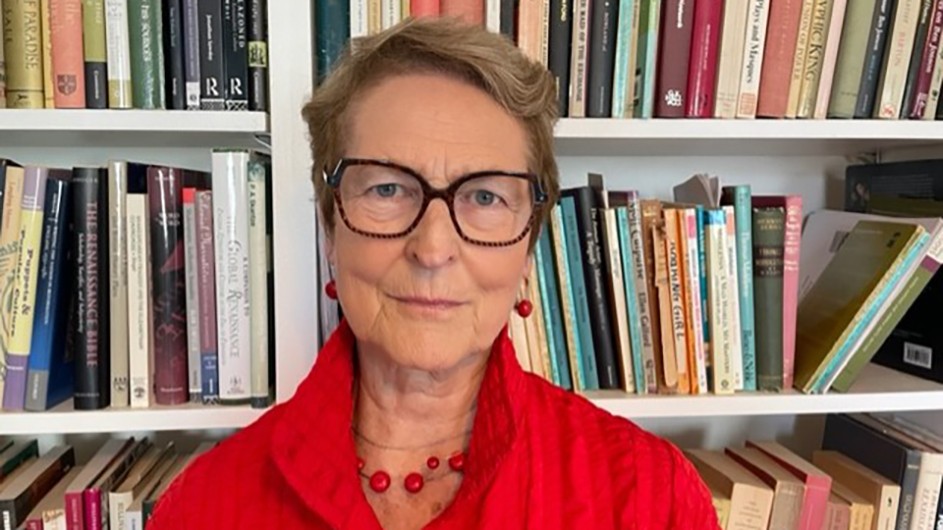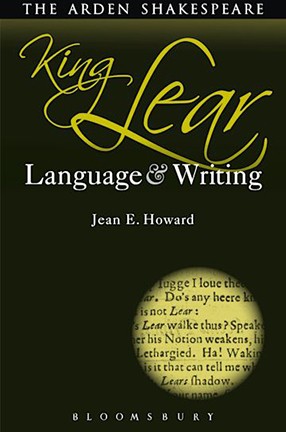A New Book About 'King Lear' Focuses on the Play’s Language
Professor Jean Howard fuses critical insight with practical guidance on how to engage with Shakespeare.

In King Lear: Language and Writing, Jean Howard, the George Delacorte Professor in the Humanities, combines critical insight and practical guidance on how to engage fully with Shakespeare's text. The book’s focus is on language—both understanding and enjoying Lear’s complex dramatic words.
King Lear: Language and Writing reveals how the play's elemental power springs from its language—simple, relentless, and resonant—as well as from its double plot that multiplies the follies and the pain of its protagonists. Howard’s chapters explore the play's status as a tragedy, its stagecraft, primary source material, and its textual and theater history.
Columbia News caught up with Howard to ask her about the book, as well as what she’s read recently—everything from Ann Patchett to Hermione Lee—where she’s headed this summer, and who she would like to spend an evening with.
Q. How did this book come about?
A. The book originated from my many years of teaching Shakespeare. King Lear has long been my favorite of his tragedies, the play that most deeply speaks to the ruination that humans inflict on each other and on the world. Lear is also one of the most formally inventive of his plays, with its well-developed double plot and arresting language. I wanted to help students find accessible ways into the play, ways that would allow them to make Lear their own by engaging deeply with its formal features and tragic vision.

Q. With King Lear, which is more important language or plot? Or are both equally important? What makes Lear such a distinctive Shakespearean tragedy?
A. It's impossible to give primacy to language or to plot and dramatic structure because they reinforce each other. My book looks very carefully at the language of King Lear, by which I mean both the verbal rhetoric and the languages of gesture, costume, and movement through which Shakespeare choreographs stage action. Teaching students how to attend to puns and rhyme goes hand in hand with teaching them how to decipher the importance of original stage directions and references to the clothes characters wear and the objects they carry.
All these meaning-making elements are embedded in a unique double plot that works by repetition. Mistakes and acts of violence and cruelty happen over and over, creating a picture of human life that is almost unbearable. The play is singular for that double plot and for its epic scope, but also for its utterly heartbreaking monosyllables: "Howl, howl, howl." "Why should a dog, a horse, a rat have life, / And thou no breath at all?"
Q. What do you read when you're working on a book, and what kind of reading do you avoid while writing?
A. I don't avoid any particular kind of book when I am writing a critical study. My reading is always eclectic and opportunistic. Whether I am writing a book or not, I try to keep up with the latest criticism in my field, works of history (I always read the Bancroft Prize books, for example), books by or recommended by colleagues, ones that pop up in the pages of the Times Literary Supplement or The London Review of Books, and tons of new plays and novels by established and emerging writers.
Q. What have you read lately that you would recommend, and why?
A. I was really moved by many of the essays in Ann Patchett's These Precious Days. I like her more as an essayist than a novelist, and I was struck by how many of these pieces deal with mortality, a major theme of our COVID era, and by the value she has found in being a bookstore owner trying to create a space for conversation about politics and art to flourish. She has clearly found a way to make her life count.
I recently read Hermione Lee's biography of Tom Stoppard after reading his recent play, Leopoldstadt, about a Jewish family in Vienna before and during the Holocaust. I have always loved Stoppard's wit, his intricate stagecraft, and his originality. Lee made me appreciate these things even more, and to understand their roots in Stoppard's complex life, which included the late discovery of his own Jewishness.
Last night I finished Station Eleven, Emily St. John Mandel's novel about a devastating plague that wipes out 99 percent of earth's population. Among the survivors is a troupe of actors who travel through the upper Midwest performing Shakespeare. It spurs thoughts about catastrophe and the persistence of art. Right before that I read Marina Warner's Indigo, a complex rewriting of The Tempest that goes back and forth between the colonial moment in the Caribbean and its long aftermath in 20th-century Britain. Why, I ask myself, is this fabulous and deeply disturbing novel not better known?
Q. What are you planning on reading before the fall semester starts?
A. I have a stack of things lined up, including all the plays in August Wilson's Pittsburgh cycle. I have read them before, but in a scattered way. Now I am going to write about them, and I look forward to going back and reading them all in order, each dealing with a different decade of the 20th century.
Then I'll focus on some new books for the Prison Literature course I am revamping to teach again in the fall, including the poetry of Etheridge Knight, Edwidge Danticat's Brother, I'm Dying, and Asha Bandele's The Prisoner's Wife. Unfortunately, the literature of the American prison experience just keeps expanding. Also on my summer list are new plays by Winsome Pinnock, Lucy Kirkwood, and Samuel Hunter.
Q. What are your summer plans?
A. I am going to Maine and rusticate. For me, that means I'll read, write, swim in the ocean.
Q. You're hosting a dinner party. Which three academics or scholars, dead or alive, would you invite, and why?
A. My guests would all be women because, in my experience, women really listen to one another when they get together, and they know how to have fun, too. Just three is hard, but surely Toni Morrison, one of the wisest and most creative people to have blessed American academic life; Wendy Brown, whose political thought and political actions always rearrange my brain; and Angela Davis, a thinker and writer who just carries on being brilliant and brave.